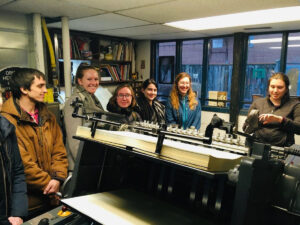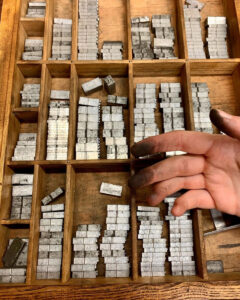BKS 1001H: Introduction to Book History
Prof. David Fernández (Thomas Fisher Rare Book Library), Fall 2023, Mondays 2:00 – 5:00 pm, Fisher Library.
This foundational course, required for all BHPC students in their first term, will introduce students to basic topics such as the semiotics of the book; orality and writing systems; book production from manuscript to computer technology; the development of printing; the concept of authorship; copyright; censorship; the economics of book production and distribution; libraries and the organization of information; principles of bibliographical description; print in other formats (newspapers, magazines, advertisements, etc.); reading and readership; editorial theory and practice.
Sample syllabi:
- (Fall 2022) Fernández_BKS1001H_f2022.pdf
- (Fall 2023) Fernández_BKS1001H_f2023.pdf
BKS 1002H: Book History in Practice
Prof. Alan Galey (Faculty of Information), Winter 2024, Mondays 2:00 – 5:00 pm, Round Room, Massey College.
Offered in the Winter Term and required for all Master’s students in the BHPC Collaborative Specialization, this course develops many of the themes from BKS1001H in a seminar format. The approach of the course reflects what David Greetham calls “the disciplinary interrelatedness of all aspects of the study of the book” (Textual Scholarship: An Introduction, p. 2). The course consists of seminars on key topics in book history, punctuated by case studies of particular books, events, and debates. These case studies are designed to pull together ongoing threads of inquiry from the readings, and to allow students to work outward from specific artifacts to general questions. Prerequisite: BKS1001H.
Sample syllabi:
- (Winter 2022) Battershill_BKS1002H_w2022.pdf
- (Winter 2024) Galey_BKS1002H_w2024.pdf
BKS 2000H: Advanced Seminar in Book History and Print Culture
An advanced seminar required for all doctoral students in the BHPC Collaborative Specialization, this course will vary in content from year to year depending upon the expertise of the faculty member appointed to lead it. The term-paper research project will be open to work in all disciplines, periods, and languages in consultation with the instructor. Prerequisite or corequisite for BHPC students: BKS1001H. May be available without prerequisite to students outside the program by permission of instructor.
2024-2025 seminar:
Making Critical-Creative Editions
Prof. Claire Battershill (Faculty of Information/Department of English), Winter 2025, Thursdays, 12:00 – 3:00 pm, Round Room, Massey College.
In this hands-on, project-based seminar, students will apply their knowledge of historical book forms to the making of a new conceptual edition or adaptation of a work of their choosing. The course will begin with sessions in in the Thomas Fisher Rare Book Library and the Robertson Davies Library, where we examine a variety of examples of creative-critical editions produced by book artists and scholars (including a knitted copy of Finnegans Wake by Ximena Perez Grobet; an artists’ book edition of Virginia Woolf’s “The Mark on the Wall” by Ane Thon Knutsen; and some of the many, many versions of Alice in Wonderland housed at the Fisher, among others). We’ll consider these case studies alongside critical issues in edition making (including copyright; theories of editing and adaptation; creative, feminist, queer, digital, and decolonial approaches to editing).
The students’ project work will begin with an exercise in choosing a text to recreate (in any genre, language, or style corresponding to each student’s area of research) and identifying the affective, critical, and conceptual elements of the text that matter most to them through a series of creative close reading exercises. Once each student has selected and analysed their text, they will be invited to assess the existing editions of the work available through the U of T library system (including all manner of publications from affordable reprint editions marketed to students to first and fine editions). Finally, the student will plan and execute a new edition of the work. This might take the form of an artists’ book, a zine, a scholarly or critical edition, a digital edition, a performance, or any other mode of engagement that a student might imagine. No creative experience or familiarity with book arts is required for this course: students will be provided with direct instruction and support in the “making” techniques needed to execute their editions (techniques might include but are not limited to letterpress printing in the Massey College Bibliography Room, papermaking, ink making, relief printing, illustration, digital drawing, performance practice, scholarly editing).
2023-2024 seminar:
Global Histories of the Archives
Prof. Natalie Rothman (Dept. of History), Winter 2024, Wednesdays, 10:00 am – 1:00 pm, Round Room, Massey College.
What does the history of books have to do with the so-called “archival turn”? And how might both respond to the challenges of global and entangled history? This course introduces students to book history and the history of archives as inter-related fields. In particular, it thematizes mobility – of textual artifacts, technologies, genres, scribal practices and practitioners – across presumed divides (manuscript:print:digital; pre:modern; metropole:colony; north:south; east:west) in the making of both “books” and “archives” as objects of study. Through a series of case studies students will explore how both books and archives (and books in archives!), as specific instantiations of textual materiality and institutionalization, might be thought of not as inert “objects” waiting to be mined extractively, but rather as processes imbued with social lives and shaped by contingent textual practices. Course readings and activities will offer a strong grasp of two thriving historiographical fields and their significant intersections, as well as divergent conceptual and methodological frameworks for further research across them.
A list of previous offerings of BKS 2000H can be found here.
BKS2001H: Practicum in Book History and Print Culture
An individual project for PhD students intended to serve as a bridge from coursework to the dissertation, taken under the supervision of a BHPC-affiliated faculty member. The practicum project may lead directly into dissertation research, or may allow the student to explore a side project, and the student’s approach should be decided in consultation with the PhD supervisor and BHPC Director. The primary learning outcome of any BKS 2001H project should be for the student to be able to translate individual research interests into scholarly projects that engage with methods and concepts from the field of book history, broadly defined. Proposals from BHPC Master’s students may be considered under exceptional circumstances; interested Master’s students should email the Director and Program Coordinator well in advance of the deadline to consult about eligibility.
Timing. Enrolment is normally limited to doctoral students in the BHPC Program. BKS 2001H should be completed by the end of the student’s coursework period within the home unit (normally Year 1), or in the summer immediately thereafter. Please note that eligibility for the BHPC Student Research Awards and BHPC Printing Apprenticeships at Massey College is conditional upon timely enrolment in BKS 2001H.
Types of Projects. Examples of BHPC practicum projects include exhibitions and/or accompanying catalogues, online exhibitions or other digital projects, bibliographies, scholarly editions of short works and other forms of in-depth case studies, and printing or other projects in conjunction with the Massey College Library’s Bibliography Room. A list of completed practicum projects may be found here. Students are welcome and encouraged to expand upon the forms of previous practicum projects, and to propose hands-on projects that take advantage of the resources available through Massey College, the University of Toronto, and the city’s book arts community, and are advised to consult with librarians and archivists as they plan their projects. It is possible for a student to work closely with a non-faculty mentor or collaborator, as long as the official practicum supervisor holds an SGS appointment and BHPC affiliation. (The BHPC Director can add new faculty members to the affiliated list upon their request, provided the faculty member’s research has a demonstrable connection to BHPC’s fields of study, broadly defined.)
Students whose projects incur expenses for materials (e.g. special paper for a printing project) are encouraged to contact the Director and Program Coordinator.
Grading and Structure. The practicum is a graded course. The student and supervisor must consult in advance on how the final grade will be determined, and make the grading structure (including percentages for graded deliverables) clear in the practicum proposal. The participation grade, if any, may not exceed 20% of the course grade. It is recommended that students and supervisors avoid single end-of-term deliverables worth more than 80%, and instead break large assignments into smaller, separately graded stages (e.g. a preliminary outline, annotated bibliography, etc.) so that students receive feedback early in the project. (See also the section on reading and research courses, under “Alternate Course Types,” in the SGS Policy on Graduate Courses & Other Academic Activities.)
Submitting a Proposal. The practicum proposal must be submitted to the Program Coordinator (bookhistory@masseycollege.ca) by November 1 for a Winter Term course and April 1 for a Summer or Fall course. The proposal should be a single PDF document, and should include the following information:
- practicum title
- name of practicum supervisor
- 500-word description of the project, detailing its scope, methods, goals, and the collections and resources it will draw upon
- a brief bibliography of primary and secondary sources
- grading structure
The practicum supervisor should also send the Program Coordinator an email confirming that they’ve read and approved the proposal. Proposals will be reviewed by the Program Director and Committee, with the results communicated to students normally within two weeks of submission. Students must then register for the course on ACORN and adhere to the usual SGS schedule for the session concerned.
Examples of successful proposals may be requested from the Program Coordinator.
Final Grade Submission. Supervisors must submit final course grades to the Program Coordinator at least 10 business days prior to the SGS grade submission deadline for the term (see the SGS listing of sessional dates for specific deadlines. Please note that outside of serious health or personal emergencies, there is normally no flexibility on SGS grade submission deadlines. Supervisors and students should determine assignment deadlines accordingly.


